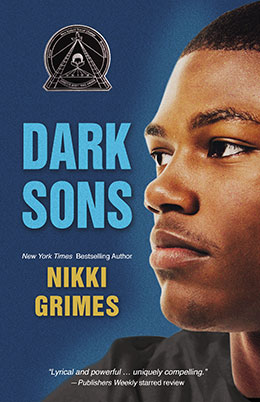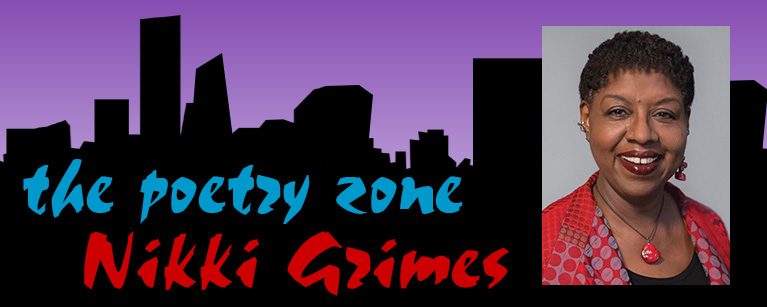
written by Nikki Grimes
Jump at theSun/Hyperion Books for Children, 2005
Zondervan, 2010
Buy this book:
paperback
e‑book
audio book
Dark Sons
From the book:
Three Tents (Ishmael)
“Three tents:
His, hers, ours,
goatskin fortresses
separated by severed promises,
cultural circumstances,
and yards of useless pride.
Even so,
we are joined together
by one invisible, thread:
Blood
red.”
Two Houses (Sam)
“Trading spaces
makes me dizzy.
Two houses,
two beds,
two dressers,
two closets,
two sets of rooms
and rules,
two sets of parents
who split on
the shoulds and shouldn’ts.
Einstein would have trouble
keeping track.
I lack the finesse, myself,
and so sometimes
I throw my hands up,
go for a walk, and tell
the so-called grownups
to work it out.”
from Dark Sons
© 2005 by Nikki Grimes
Listen to Nikki Grimes read “Field Trip” from Dark Sons:
Awards and Recognition
- 2003 Coretta Scott King Author Honor Book
- CNN.com Best Books for Kids 2005
- NCTE Notable Book in the Language Arts
- New YorkPublic Library’s Books for the TeenAge
- TAYSHAS HighSchool Reading List 2006/07
- YALSA Best Book for Young Adults
Resources
Reviews
Why does he have to run off? / To start some new family?/ With her?’ Teenage Sam can barely contain his fury and hurt when his father gets married again, this time to a young white woman who gives Sam a new baby brother. In a parallel, first-person narrative that draws on Genesis, young Ishmael and his mother,Hagar, rejected by Abraham, wander in the desert, where Sarah bears Abraham’s child. Grimes’ clear, free verse speaks with immediacy and lyricism about both boys’ feelings of betrayal and loss. The real focus, though, is onSam, who complains to his high-school friends (‘it’s my stepmom, man. / My dad wants me / to give her a chance / but I can’t’) and talks to and screams at God—until he’s able to ask God to help him let his anger go. The simple words eloquently reveal what it’s like to miss someone (‘I’ve stopped expecting / his shadow in the hallway / his frame in the doorway’), but even more moving is the struggle to forgive and the affection each boy feels for the baby that displaces him. The elemental connections and the hope (‘You made it / in the end / and so will I’) will speak to a wide audience. (Booklist, starred review)
Both lyrical and powerful, Grimes’s (What Is Goodbye?) unusual novel is a meditation on faith and father-son relationships, and the incisive development of the two central characters through their alternating perspectives may well help readers overcome the overtly religious message. The novel begins with the Biblical story of Ishmael, son of Abraham, followed by the contemporary story of Sam, whose father marries another woman. While Ishmael’s story is generally more complex and metaphorically rich, the parallel stories resonate with similar emotional appeals. In Books I and II, each son initially describes feelings of resentment and abandonment, as well as his fierce loyalty to his wronged mother. “He calls himself my father./ So why is he sending me away?” asks Ishmael; while Sam asks, “Why does he have to run off?/ To start some new family?/ With her?” Then in Books III and IV, each describes how he finds his way towards forgiveness and hope. Grimes’s commanding metaphors (“Look at you, mother,/ trembling,/ a bowshot away,/ your tears/ the only water/ for miles,” says the exiled Ishmael), authoritative style and complex characterizations are uniquely compelling. She explicitly draws the characters’ lives together in the epilogue, with two poems that detail how Ishmael realizes that God has always been “looking out for me/ as only a parent would,/ being the one father/ I could count on,” and Sam discovers in his devotions the Biblical story of Ishmael, “A guy whose father/ ripped his heart out too./ Me and you, Ishmael,/ we’re brothers,/ two dark sons,/ …/ You made it/ in the end/ and so will I. (Publishers Weekly)


